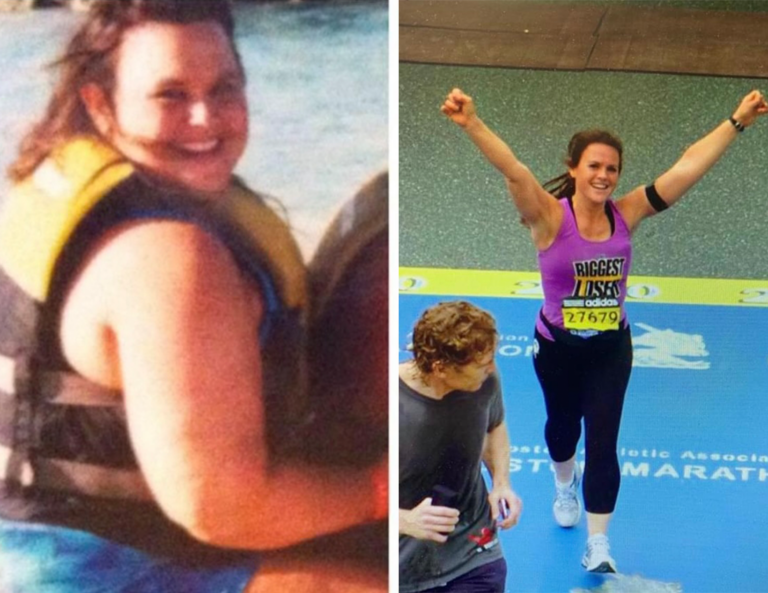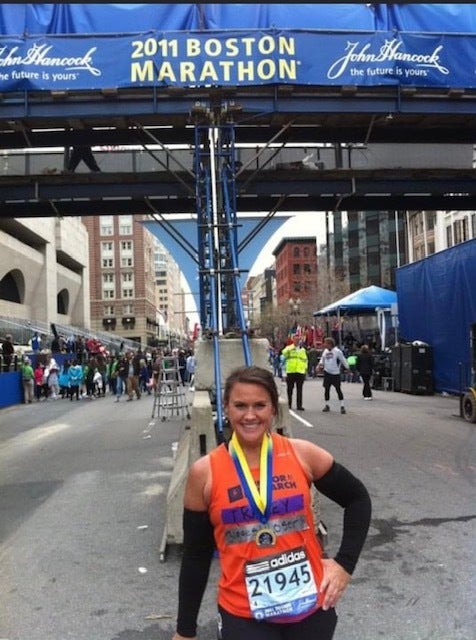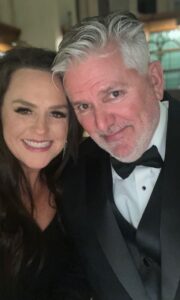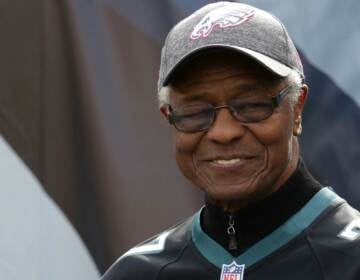Surviving ‘The Biggest Loser’: Tracey Yukich Lane's untold story
16 years after "The Biggest Loser", Tracey Yukich Lane opens up about her experience, being painted a villain, and keeping the weight off.
Listen 18:05
In 2009, Tracey Yukich Lane competed in Reality TV Show 'The Biggest Loser.' (Courtesy of Yukich Lane)
This story is from The Pulse, a weekly health and science podcast. Subscribe on Apple Podcasts, Spotify, or wherever you get your podcasts.
Find our full episode on metabolism and weight loss here.
The challenge didn’t sound so bad to Tracey Yukich Lane: run a mile.
“A mile? I have four kids. I’ve been running around with these kids for years. Of course, I can run a mile. Are you kidding me?” she recalls.
But the stakes for this challenge were extremely high. Lane had made it onto the weight loss reality show, “The Biggest Loser,” season 8, which came out in 2009. At the start of the show, Lane weighed about 250 pounds, and she felt like losing weight would solve all of her problems. “I was unhappy in my marriage. I was unhappy in who I was as a person.”
So on a beach in California with the cameras rolling, she decided to go full steam ahead on the show’s first challenge. “And in my head I’m thinking, ‘OK, this is it. I’m getting ready to do something for myself. I’m really getting ready to change everything about my life.’”
At first, she quickly got ahead of the other contestants, running at a good clip.Then, she slowed down, fell to the ground, and started to crawl.
“And I feel my legs just becoming very heavy and very hot. I can’t figure out why I feel disoriented and what is going on with my body,” she said.
The other contestants helped carry her across the finish line, where she collapsed, unresponsive. A helicopter took Lane to the hospital, where she was diagnosed with rhabdomyolysis, a condition where muscle tissue breaks down, releasing toxic substances into the body that damage the kidneys.
“I was so weak when I was in the hospital, I was not well. I was incredibly ill,” she said.
A big decision and life-changing moment
Lane felt torn. Should she go home? Or try to compete anyway?
She called her husband at the time to talk it over. He didn’t answer, which upset Lane. Their relationship was in a rocky place, there had been infidelity before. So she checked his voicemails. What she heard deeply upset her.
Subscribe to The Pulse
“I’m like, ‘I’m here fighting for my life. This is still going on in my marriage.’ And I felt so defeated and so distraught and so upset.”
Moments later, Robert Huizenga, a physician and the show’s medical advisor, walked into the room. He suggested she should go to a rehab facility to get better, and not compete on the show. They talked for a long time, a deep heart-to-heart conversation, where Lane opened up about everything. Her shame about her weight, the struggles in her marriage, the exhaustion she felt as a mom of four.
“I want something more,” she recalls telling Huizenga.
And then she burst out with her decision. “I’m going to go on the show. You guys are going to help me. I’m going to lose weight. I’m going to choose me this time. I’m going to do this for myself,” she told Huizenga.
On set but not in the gym
When Lane left the hospital, and stepped back onto the set of “The Biggest Loser,” she wasn’t allowed to exercise with the other contestants in the gym, to participate in the show’s signature grueling workout sessions. But, she wasn’t sitting around, either.
“This was not shared on television. I haven’t even spoken about it publicly either, so I’m going to tell you right now,” Lane said during her interview with The Pulse. “They make it look like I wasn’t doing any exercise and I was just sitting around. That is not correct. I was exercising while I was there.” She said she spent a lot of time in “The Biggest Loser” ranch pool.
“I swam like Nemo and Dory in the ocean. And I swam every day for hours.” She also said she did all of the dishes while the other contestants were at the gym.
But she was worried that not doing the strenuous workouts at the gym would put her at a disadvantage when it came to the show’s dramatic weigh-ins. She was also eating more calories than the other contestants, because of her medical issue. So she looked for other ways to gain the upper hand: the show’s weekly challenges.
During one challenge, she ate a plate of cupcakes to control who did or did not have to weigh in, swaying who was sent home that week. These moves did not make her popular with the other contestants, or the coaches.
She was nervous when she stepped onto the scale for the first time, after her first week on the show, but she had lost 10 pounds, a competitive amount for the show.
The week after, she had dropped 11 more pounds. This seemed to annoy and confuse her fellow contestants and especially the show’s pushy fitness trainers. How was she shedding pounds at the same rate or even faster than some of the other contestants, who were spending grueling hours in the gym?
Lane’s weight loss seemed to go against the show’s mantra — that cutting calories in combination with extreme exercise would melt the pounds away.
The response to Lane’s number on the scale was a chilling silence.
“That scale that I lost 11 pounds and nobody clapped for me — it taught me the biggest lesson ever,” said Lane. “I don’t need anybody else to clap for me.”
Being cast as a villain, and life after ‘The Biggest Loser’
Lane was eliminated in week eight, but she ended up losing 118 pounds by the show’s finale.
She says she got some great advice from the show’s head athletic trainer, Sandy Krum. “He said, ‘Tracey, don’t stop moving.’ That’s what he said to me. That just stayed with me for so many years. It stays with me even now, today, when I just kept going. So I went home and that’s what I did. I didn’t stop moving.”

When she returned home after filming, she started the process of separating from her husband. And when the show started to air, Lane realized that with all of the edits and production, she was coming across as a villain: a selfish, cut-throat person, who would do anything to get an advantage.
“I’m watching and I am just appalled at what I’m seeing. It’s just the way that they spun it to make it look like I just didn’t care about anybody else because I was playing the game,” she said. “It was honestly gut wrenching.”
Lane started getting hate mail, and stopped watching the show.
But, she was determined to hold on to the gains she had made during the show.
“‘The Biggest Loser’ changed my life. Having the opportunity to be on the show changed my life. I was the one that actually changed my life.”
Fitness and exercise became daily habits, as did good nutrition and portion control. She started therapy for binge eating, and to work through past hurts and abuse.
Lessons on metabolism
Lane also learned about her metabolism through “The Biggest Loser,” thanks to a study led by researcher Kevin Hall, who observed contestants during season 8, and then again six years later. He found that for many of the contestants who participated in this study, their metabolic rate slowed down significantly, their bodies adjusted to fewer calories coming in, and this slowdown persisted for years with each contestant. But, the slowdown didn’t prevent people from losing weight.
“It turned out that the people who had lost the most weight actually experienced the greatest metabolic slowdown,” said Hall. “In other words, metabolism was not driving the cart, it was kind of following. It was a response, not a determinant of weight loss.”
Hall said that the people who kept exercising regularly had the most success in keeping the pounds off after the show.
Through this research, Lane learned that she had the slowest metabolism in the group, which she says was eye-opening for her.
“It really gave me some answers because I do feel like I have to work a bit harder than someone else who maybe have never had an obesity problem. When it comes to losing weight and when it comes to exercise, I feel like I have to do more than the average person,” she said.
At first, she says she felt defeated when she found out that her slow metabolic rate had persisted. “And so I had to kind of get myself out of that headspace and I had to be in more of a positive headspace and say, ‘okay, Tracey, you can move your body. You know how to do this. You know how to proportion your meals. You know how to think about this. You can still do this journey. This is not defeat. You just got to be better.’”
Finding balance, joy and acceptance
Lane recently participated in a Netflix documentary series about “The Biggest Loser,” called “Fit for TV: The Reality of The Biggest Loser.” She was reluctant to do it at first.

“I said no a couple of times because I just felt like I didn’t want to be in that space again.” But then she decided that this was her chance to tell her own story. “No one else should tell it. And no one knew either because I never spoke publicly about how I did feel going through that process on “The Biggest Loser.” So it was really freeing to be able to do that.”
She says she did have to return to therapy, though, because past hurts came back up. She says doing the documentary helped her realize how far she’s come.
“I do feel good about myself and I do feel healthy. I exercise every single day. I do something to move my body, whether it’s extremely vigorous or it’s not vigorous. And I don’t like to say, ‘oh, today I just went for a walk.’ Going for a walk is amazing.”
She says thinking about her weight still takes up a lot of headspace. “I am worried that I’m going to be 300 pounds again and I don’t want to be. So I have to do everything I can to maintain what I’m doing now, but I’m constantly trying to be better. I’m constantly chasing that monkey on my back.”
For the documentary, she rewatched a lot of the original “Biggest Loser” footage, seeing her younger self struggle.
“Not a lot of people get to look at television and see themselves age and see themselves become a better person as well,” she said. “I have so much more courage now than I did then. Even though I felt like I had a lot of courage then. I’m just a different person. I’m a different mom. Just everything in my life changed from that day on the beach when I almost lost my life. Everything changed.”
WHYY is your source for fact-based, in-depth journalism and information. As a nonprofit organization, we rely on financial support from readers like you. Please give today.







